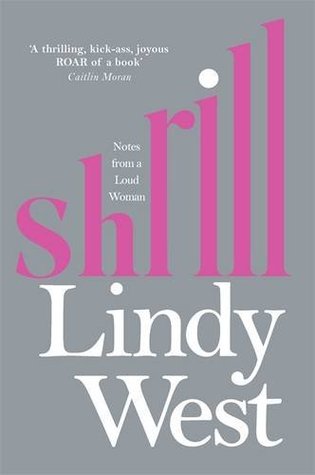 A confession: when I received a
copy of Lindy West’s ‘Shrill’ (subtitled ‘Notes from a Loud Woman’), my first
thought was ‘who?’ And I admit that the thought of reading a memoir by someone
I’d never heard of held little appeal given memoir isn't one of my favourite genres. Subsequent investigation however has
shown that West is a respected journalist with a weekly column in The Guardian, a former blogger for
Jezebel.com and a culture writer for GQ. She’s
also a well-known Twitter commentator with over 71,000 followers. Despite all
this I’ll also admit that, cynically, the thought crossed my mind that ‘Shrill’
might be yet another humorous rage-against-the-patriarchy manifesto to spring
up in the wake of Caitlin Moran’s ‘How to be a Woman’; a thought not quashed by
Moran’s blurb on the cover.
A confession: when I received a
copy of Lindy West’s ‘Shrill’ (subtitled ‘Notes from a Loud Woman’), my first
thought was ‘who?’ And I admit that the thought of reading a memoir by someone
I’d never heard of held little appeal given memoir isn't one of my favourite genres. Subsequent investigation however has
shown that West is a respected journalist with a weekly column in The Guardian, a former blogger for
Jezebel.com and a culture writer for GQ. She’s
also a well-known Twitter commentator with over 71,000 followers. Despite all
this I’ll also admit that, cynically, the thought crossed my mind that ‘Shrill’
might be yet another humorous rage-against-the-patriarchy manifesto to spring
up in the wake of Caitlin Moran’s ‘How to be a Woman’; a thought not quashed by
Moran’s blurb on the cover.
How wrong I was on all counts. Whilst West
certainly can (and does) use humour to her advantage when needed (the book explores,
amongst other topics, her stint on the stand-up comedy circuit in her native
Seattle), ‘Shrill’ is a considerably angrier book whilst, at the same time,
being less actively concerned with a traditional feminist agenda. And whilst
both books examine how the writers came to develop their voice, ‘Shrill’ is arguably
more focused as a memoir, examining the specific events that led West from
cripplingly shy teenager to vocal, fearless and provocative woman who is
unafraid of being loud.
“Women matter. Women are half of us. When you raise every woman to
believe that we are insignificant, that we are broken, that we are sick, that
the only cure is starvation and restraint and smallness; when you pit women
against one another, keep us shackled by shame [….] that moves the rudder of
the world.”
Her journey takes her from
tackling the issue of fat-shaming, to Twitter trolls via rape culture,
workplace misogyny and the free speech debate. We follow West as she comes to
identify herself firstly as a woman, then as a fat woman, then as a fat funny
woman and finally as a fat funny woman with a voice that deserves to be heard. As
such the book is definitely gentler in its earlier stages and I do feel it
takes a few chapters for the tone to even out and West to get into her stride.
From the defiant chapter ‘Hello, I am Fat’ onwards however, it’s a fearless
shout against social expectations, which confronts a number of unpalatable and
uncomfortable truths about women’s lives.
“This is how society has always functioned. Stay indoors, women. Stay
safe. Stay quiet. Stay in the kitchen. Stay pregnant. Stay out of the world. If
you want to talk about silencing, censorship, placing limits and consequences
on speech, this is what it looks like.”
As with the best writing of this
type, West is excellent at taking aim at an issue, skewering it to a post and
picking it to bits with a rapier sharp wit and more than a dash of black
humour. What is refreshing however, is that she doesn’t just want you to laugh
along with her. West wants you, the reader, to engage. To be angry, to question
and to challenge. To stop being quiet. She makes statements that provoke, and
creates catalysts for conversation.
“Women are told, from birth, that it’s our job to be small: physically
small, small in our presence, and small in our impact on the world. We’re
supposed to spend our lives passive, quiet, and hungry. With this book, I want
to obliterate that expectation.”
I consider myself a feminist but
I found myself questioning my own position on the language of ‘clean eating’
and ‘health’, on the comedy I’ve previously found funny and on the defensive
stance (i.e. ‘do not feed the trolls’) so many female commentators (myself
included) take when encountering misogyny on the internet.
All in all, this makes ‘Shrill’ a
very different book to ‘How to be a Woman’. Where Moran laughs at misogyny and
patriarchy, making it seem small by reducing it to absurdities; West is
confronting it in a different way, locking horns with the trolls and roaring
into the void, daring it to challenge her. Both are valid and increasingly
necessary approaches to being an engaged woman in the modern world. As such,
‘Shrill’ is a very welcome addition to the conversation which will both anger
and delight in equal measure. Having read it I not only know who Lindy West is,
but I no longer think of being a shrill; of having an opinion and of that
differing to someone else’s, as a bad thing. And for that, Lindy West, I thank
you.
‘Shrill: Notes from a Loud Woman’ by Lindy West is published by Quercus
and is available now as a hardback, ebook and audio from all good bookshops and
retailers. My thanks go to the publisher and Real Readers for providing a copy
of the book in return for an honest and unbiased review.
No comments:
Post a Comment